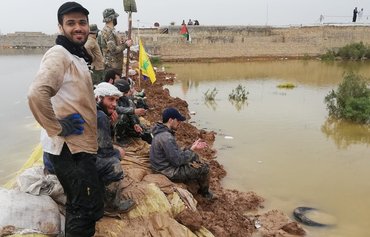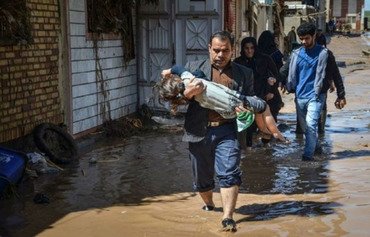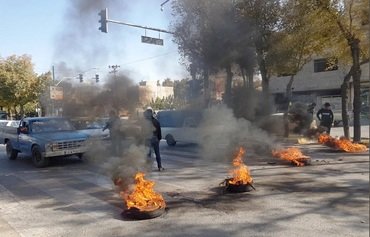With its decision to bring in foreign militias to help it suppress dissent in flood-afflicted areas, Iran's Islamic Revolutionary Guard Corps (IRGC) has revealed the scale of the crisis it is facing, experts on Iran told Al-Mashareq.
Popular anger has been simmering in Iran over the way the Islamic Republic has responded to the catastrophic flooding, and over the gross neglect of infrastructure that compounded its devastating effect.
The deployment of IRGC-affiliated militias from countries such as Iraq and Lebanon has contributed to the growing climate of dissent following the flooding, which displaced thousands of Iranians and caused wide-scale damage.
Factions of Iraq's Popular Mobilisation Forces (PMF), Lebanon's Hizbullah and the Fatemiyoun Brigade, an IRGC-backed militia comprised of Afghan fighters, have been observed in the Ahwaz, Khuzestan and Lorestan regions.
![Members of Lebanon's Hizbullah post their flag in Iran's flood-stricken Ahwaz region. [Photo circulated on social media]](/cnmi_di/images/2019/06/10/18449-Hizbullah-Ahwaz-Iran-600_384.jpg)
Members of Lebanon's Hizbullah post their flag in Iran's flood-stricken Ahwaz region. [Photo circulated on social media]
![Damage caused by floodwater has ravaged several parts of Iran and has sparked protests about the government's response. [Photo circulated on social media]](/cnmi_di/images/2019/06/10/18450-Iran-flood-damage-600_384.jpg)
Damage caused by floodwater has ravaged several parts of Iran and has sparked protests about the government's response. [Photo circulated on social media]
Ahwaz has been the scene of popular demonstrations against the IRGC and government, according to Al-Sharq Centre for Regional and Strategic Studies researcher Fathi al-Sayed, who specializes in Iranian affairs.
"These groups deploy around and encircle [those] regions to suppress any popular action," he told Al-Mashareq.
By bringing in its foreign affiliates to help quell the demonstrations, the IRGC seeks to send a message to the Iranian people "that extreme suppression awaits those who rebel", al-Sayed said.
For the outside world, he said, the deployment of foreign militias is intended to serve as a serious reminder that "the IRGC can move its forces across borders in the Middle East, or in other words, can respond to any threat anywhere".
Misappropriation of aid funds
One of the main sources of public anger is the IRGC's misappropriation of money local and foreign donors have earmarked for flood relief.
"The IRGC has put its hands on the aid money collected inside Iran as well as the money donated by some Western and Arab countries that was intended for those affected by the floods," political analyst Ali Narimani told Al-Mashareq.
"However, no cash or in-kind aid has so far been recorded as having been distributed to the affected," he said, noting that it has probably been diverted to the foreign militias who "supposedly came to support and provide relief".
Narimani said the floods gave rise to a sort of social solidarity among the thousands of people of the flood-ravaged areas, who took it upon themselves to organise relief teams to help clean up in the flood's aftermath.
But IRGC-affiliated forces detained 40 people involved in that effort, he said, in addition to confiscating the aid funds they had collected to help the afflicted.
"At the same time, (Lebanese) Hizbullah and (Iraqi) Harakat al-Nujaba elements are openly deploying and raising their flags in a way that is provocative to civilians," Narimani said.
These militias have not undertaken any relief work, he pointed out, and are merely stationed at specific points from which they can quickly deploy to suppress protests.
IRGC protects its own interests
In its response to the flooding, the IRGC's clear priority has been to protect its own revenue-generating investments in the area, which include oilfields and sugar cane plantations owned by IRGC companies.
This also has "raised the ire of civilians", Narimani said.
"The IRGC's use of its foreign affiliates is a very serious and important indication that it does not trust the local security forces to put down demonstrations that may be held against the government or the IRGC," said Iranian affairs researcher Sheyar Turko.
"The entry of these armed groups is not welcomed, even by those close to the decision-making circles," he told Al-Mashareq, especially after it became known that the entry of these groups was unilaterally arranged by the IRGC.

![IRGC Quds Force commander Maj. Gen. Qassem Soleimani takes part in a meeting with senior IRGC officers and the leaders of Iran-aligned Iraqi militias at a 'crisis' meeting held in Ahwaz. [Photo circulated on social media]](/cnmi_di/images/2019/06/10/18448-Ahwaz-Qassem-Suleimani-600_384.jpg)







This is a picture of the Popular Mobilisation Forces that went to provide relief and carry aid.
Reply2 Comment(s)
It was the Iranian Revolutionary Guards who defended Zainab Shrine. It was them who defended Iraq and its sanctities. Blessed be the soldiers of Mahdi al-Muntadar.
Reply2 Comment(s)